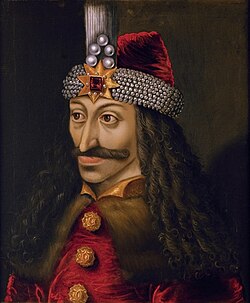Some Sundays after to have dinner I watch TV before go to bed. The other day I watched an episode of the serie: "Towns under ground". I do not know the american series original title. It seems to me a very interesting and attractive series. Attractive because it is well done, with some pictures / images made in 3-D and well explained things. You can see as the places are nowadays and as they were formerly.
Well, this episode about which I am going to talk deals with Dracula and Bucarest. I like the series because not only shows the subsoil of the towns but also of singular buildings as castles, churches, forts, amphitheatres, etc. And in this episode it is told the story of the castle of Count Dracula. In itself is interesting but there are some facts about the life and customs of the Count which, frankly, give a lot to think about the human condition or better said, on our wild human condition.
I already had heard to talk about the "impalements" (I do not know if this word exist, I meant "empalamientos") when I was a child, at the school but it is hard to believe when you hear it again when you are older.
In the episode they talk about the castle of Vlad Tepes III, prince from Walachia that with Moldova and Transylvania constituted the kingdom of Romania. A lot of characteristics of the character of the Bram Stoker's novel of 1897 are based in this "individual".
When I could hear with great detail the "hobbies" of this "type", I tried to put myself in the place of the inhabitants of the surrounding area and imagine the fear and anxiety that they had to suffer during the existence of this "twit".

A FOOL of [] History
ReplyDeleteSome Sundays after havING* dinner I watch TV before goING to bed. The other day I watched an episode of the serieS "Towns under Ground". I do not know the American series'S original title. It seems to me a very interesting and attractive series. Attractive because it is well done, with some pictures / images made in 3-D and well explained things. You can see HOW the places are nowadays and HOW they were formerly.
Well, this episode THAT I am going to talk ABOUT** deals with Dracula and BucHarest. I like the series because IT not only shows the UNDERGROUND FEATURES of the towns but also of singular/INDIVIDUAL buildings SUCH as castles, churches, forts, amphitheatres, etc. And [] this episode TELLS the story of the castle of Count Dracula. In itself IT is interesting, but there are some facts about the life and customs of the count which, frankly, give ONE a lot to think about the human condition or, better said, [] our wild human condition.
I already had heard [] about the impalements When I was a child, at [] school, but it is hard to believe when you hear it again when you are older.
In the episode they talk about the castle of Vlad Tepes III, prince from Walachia that with Moldova and Transylvania constituted the kingdom of Romania. A lot of characteristics of the character of []*** Bram Stoker's novel of 1897 are based ON this "individual".
When I HEARD ABOUT the "hobbies" of this "type", IN GREAT DETAIL, I tried to put myself in the place of the inhabitants of the surrounding area and imagine the fear and anxiety that they had to suffer during the existence of this "twit"****.
*Use the -ing form after a preposition.
**Your sentence structure was strictly correct, but rarely used nowadays.
***Avoid using "the" before a possessive.
****"Twit" is a great, colloquial word, meaning something like a harmless fool with no social skills. I don't know this history well, but perhaps the impalements call for a stronger word than "twit".
Once again Matt, thanks for your corrections and clarifications.
ReplyDeleteI didn´t know the word "twit". I was looking for something similar to "majadero".
"Majadero" can have a thousand meanings, all of them related with stupidity, ignorance, imprudence, etc. It is very used in Spain. We would say that this type devoted his life to make "majaderías". It's a softer word than "salvajadas". "Salvaje" is the word that better define this person, but in my writing, for to stress his irrational behaviour, I wanted to use "majadero".
And I found "twit", but, I left myself with the a bit void sensation of I couldn't find something better.
Hola Eduardo! He visto ese programa uno o dos veces, pero no el episodio sobre Vlad. Creo que la conmovisión de la gente del pasado sea incomprensible para nosotros. Ahora, parece que para los rumanos moderno, Vlad es un gran fuente de ingreso con los tours vampiro, etc.
ReplyDeletePor fin está hiciendo algo bueno.
Quizá, 'sadistic madman' describa lo que era Vlad...